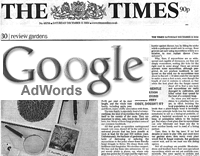 Google is set to announce a new advertising partnership with over 50 American newspapers, in an initiative designed to create an online marketplace to help Ye Olde Printe Media sell advertising electronically.
Google is set to announce a new advertising partnership with over 50 American newspapers, in an initiative designed to create an online marketplace to help Ye Olde Printe Media sell advertising electronically.
Big newspapers like The New York Times, the Chicago Tribune and The Washington Post are already onboard for the trial, with Google planning to expand the service internationally.
Under the scheme, Google will offer some of its AdWords customers the opportunity to advertise in print newspapers in much the same way as they buy advertising on the web.
Newspapers signed up to the scheme enter demographic details about their titles and give example advertising rates, while advertisers list how much they’re prepared to pay for classified space in specified titles.
Publishers then decide whether to accept the offers.
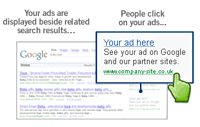 Launching as an early “alpha” trial, Google has said that it won’t initially charge for hosting the service, but expects to levy a ‘relatively modest commission’ if it takes off.
Launching as an early “alpha” trial, Google has said that it won’t initially charge for hosting the service, but expects to levy a ‘relatively modest commission’ if it takes off.
Runaway success
Google online AdWords campaign has been so successful that they’ve been able to keep up with the demand from advertisers, with Tom Phillips, Google’s director of print advertising, commenting about the print service: “This is money that our advertisers would spend with us if we had the online inventory for them to spend it on.”
Philips added that Google wanted to help the newspaper business, but was still chasing the dollar, “We are not just doing this to be friends with print media. We are doing this because there is a big business opportunity here providing value to media properties,” he added.
 Google’s turbo-charged revenue increases (up 70 per cent in the third quarter) continue to give traditional media outlets the heebie-jeebies, as advertising revenues continue to crash in tabloid and regional titles across the UK.
Google’s turbo-charged revenue increases (up 70 per cent in the third quarter) continue to give traditional media outlets the heebie-jeebies, as advertising revenues continue to crash in tabloid and regional titles across the UK.
Last week, research revealed that Google is now coining in more cash from advertising than Channel 4 in Britain, with the Internet Advertising Bureau saying that online ad spending in the UK had soared 40% in the first half of 2006 compared with the same time period last year.
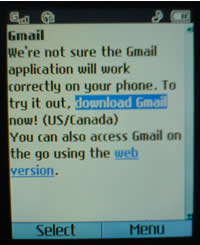 You’ve probably seen the news yesterday that
You’ve probably seen the news yesterday that 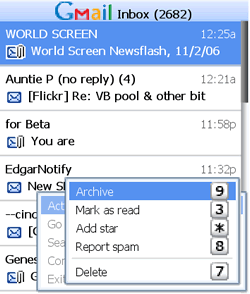 Being the inquisitive little ferrets that we are, we jumped on to our ever-at-hand mobiles to try the same thing. Not expecting much, as we’re outside the US, you can imagine our surprise when we were given the option of downloading the app – but persisted with the US/Canada only malarky. We were warned that the app might not work correctly.
Being the inquisitive little ferrets that we are, we jumped on to our ever-at-hand mobiles to try the same thing. Not expecting much, as we’re outside the US, you can imagine our surprise when we were given the option of downloading the app – but persisted with the US/Canada only malarky. We were warned that the app might not work correctly.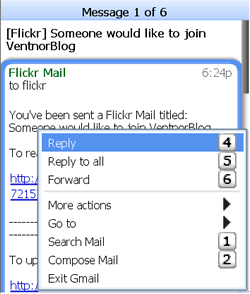 Argh .. the handset we used fell at the final hurdle, but we pressed on with some others until success! We checked in with
Argh .. the handset we used fell at the final hurdle, but we pressed on with some others until success! We checked in with 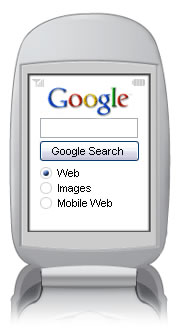 Browsing Gmail, Google’s email service, wasn’t particularly great when you did it from a mobile … until now. With the new release of gmail mobile that was launched today.
Browsing Gmail, Google’s email service, wasn’t particularly great when you did it from a mobile … until now. With the new release of gmail mobile that was launched today.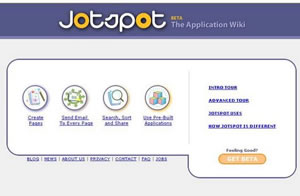 Google has bought Palo Alto, CA-based Wiki/collaborative working company, JotSpot for an undisclosed amount.
Google has bought Palo Alto, CA-based Wiki/collaborative working company, JotSpot for an undisclosed amount.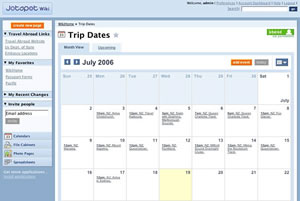 With the release of
With the release of 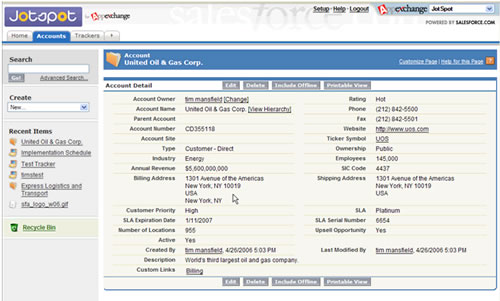
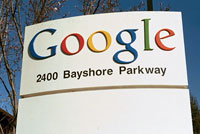 Google is converting its Californian headquarters to run partly on solar power, creating the largest solar installation on any corporate campus in the United States.
Google is converting its Californian headquarters to run partly on solar power, creating the largest solar installation on any corporate campus in the United States. Google haven’t disclosed the costs of the project, but it’s unlikely to cause much of a dent in the pockets of a company reputed to have nearly $10 billion in the corporate coffers.
Google haven’t disclosed the costs of the project, but it’s unlikely to cause much of a dent in the pockets of a company reputed to have nearly $10 billion in the corporate coffers. There’s bound to be lots of these stories floating around the Valley, as companies started getting bought for large sums of money. It’s going to be the equivalent of being/claiming to be the fifth Beatle.
There’s bound to be lots of these stories floating around the Valley, as companies started getting bought for large sums of money. It’s going to be the equivalent of being/claiming to be the fifth Beatle. Living what he was building, “Armed with a video camera, Mr. Karim documented much of YouTube’s early life.”
Living what he was building, “Armed with a video camera, Mr. Karim documented much of YouTube’s early life.” docs.google.com is the new destination for Google’s Web-based Writely word processor and their companion spreadsheet.
docs.google.com is the new destination for Google’s Web-based Writely word processor and their companion spreadsheet. As we\\’d
As we\\’d 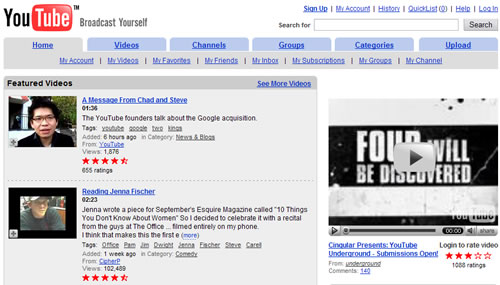
 In a Star Trek-like melding of minds, Google CEO Eric Schmidt is joining Apple Computer’s board of directors, setting tongues wagging that some kind of alliance between the technology giants could be looming.
In a Star Trek-like melding of minds, Google CEO Eric Schmidt is joining Apple Computer’s board of directors, setting tongues wagging that some kind of alliance between the technology giants could be looming.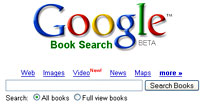 The addition of Schmidt to Apple now brings the total number of board members to eight, and these include Steve Jobs, Al Gore, former vice president of the United States and the head honchos of Intuit, J. Crew and Genentech.
The addition of Schmidt to Apple now brings the total number of board members to eight, and these include Steve Jobs, Al Gore, former vice president of the United States and the head honchos of Intuit, J. Crew and Genentech.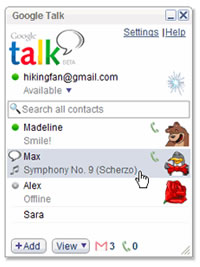 When upgrading their Instant messaging (IM) and VoIP software released earlier this week, Google has taken the opportunity to introduce a new feature – Music Trends.
When upgrading their Instant messaging (IM) and VoIP software released earlier this week, Google has taken the opportunity to introduce a new feature – Music Trends. So what? you may say. Google say it’s an interesting way to discover new music, which we’re sure has nothing to do with one of the other features of GTalk, file transfer – “cool tune, man, can you IM it over?” Surely not. Would be a great way to get people buying music, through a long rurmoured Google Music-buying site though wouldn’t it?
So what? you may say. Google say it’s an interesting way to discover new music, which we’re sure has nothing to do with one of the other features of GTalk, file transfer – “cool tune, man, can you IM it over?” Surely not. Would be a great way to get people buying music, through a long rurmoured Google Music-buying site though wouldn’t it?